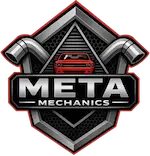At Meta Mechanics, we understand that a properly functioning oil pump is essential for maintaining the longevity and performance of your engine. Recently, we had a Range Rover Evoque in for an Engine Oil Pump Repair. After conducting a thorough inspection, our skilled technicians identified several underlying issues that were affecting the oil pump’s performance. Below is a breakdown of the issues we found and the solutions we provided to restore the vehicle’s engine performance.
Identified Issues:
- Worn-Out Oil Pump Bearings
- Problem: The oil pump bearings were significantly worn out, causing increased friction and reduced efficiency in oil circulation. This led to low oil pressure, which can cause insufficient lubrication of critical engine components, leading to overheating, excessive wear, and possible engine failure.
- Solution: We replaced the damaged oil pump bearings with high-quality OEM parts. This ensured smooth operation of the oil pump, restored proper oil pressure, and provided adequate lubrication to the engine, preventing further wear and potential damage.
- Clogged Oil Pickup Screen
- Problem: The oil pickup screen, which filters oil before it enters the pump, was found to be clogged with debris and sludge. A clogged pickup screen restricts the flow of oil, leading to lower oil pressure and inefficient lubrication, which can cause engine knocking or seizing over time.
- Solution: We removed and cleaned the oil pickup screen to restore proper oil flow. After cleaning, the oil pump was able to draw in clean oil effectively, ensuring that the engine components were well-lubricated and operating efficiently.
- Faulty Oil Pump Timing Chain
- Problem: The oil pump’s timing chain was found to be stretched and worn out, which affected the synchronization between the oil pump and the engine’s crankshaft. This can result in irregular oil flow, decreased oil pressure, and poor lubrication, all of which can negatively affect engine performance.
- Solution: We replaced the faulty timing chain with a new OEM component to restore proper synchronization between the oil pump and engine. This repair ensured smooth and consistent oil flow, allowing the engine to maintain the correct oil pressure for optimal performance.
- Damaged Oil Pump Gaskets and Seals
- Problem: Several oil pump gaskets and seals were found to be damaged or degraded, leading to oil leaks. Leaking oil can lead to a loss of lubrication, increased engine temperatures, and potential damage to surrounding components, resulting in reduced engine efficiency and reliability.
- Solution: We replaced all damaged gaskets and seals with new, high-quality OEM parts. This eliminated the oil leaks and ensured that the oil pump would operate efficiently without losing any oil, maintaining the proper pressure for effective lubrication.
- Contaminated Oil System
- Problem: The oil system was found to be contaminated with debris and sludge, which can accumulate in the oil pump and clog its internal components. This contamination can cause the pump to malfunction and decrease the engine’s ability to maintain oil pressure.
- Solution: We conducted a complete oil system flush to remove all contaminants and debris from the oil passages and pump. After the system was thoroughly cleaned, we refilled it with fresh, high-quality engine oil to ensure smooth operation and to restore the engine’s lubrication efficiency.
Range Rover Evoque Oil Pump Inspection and Diagnostics
Range Rover Evoque Oil Pump Removal and Replacement
Range Rover Evoque Oil Pump Shaft and Gear Inspection
Range Rover Evoque Oil Pump Seal and Gasket Replacement
Range Rover Evoque Oil Pressure Check and Adjustment
Range Rover Evoque Engine Oil Flow Test
Range Rover Evoque Oil Pickup Tube Cleaning or Replacement
Range Rover Evoque Oil Pump Strainer Cleaning or Replacement
Range Rover Evoque Engine Disassembly for Oil Pump Access
Range Rover Evoque Oil Pump Rebuild or Reconditioning
Range Rover Evoque Timing Chain/Belt Inspection for Oil Pump Drive
Range Rover Evoque Oil Pump Performance Testing


